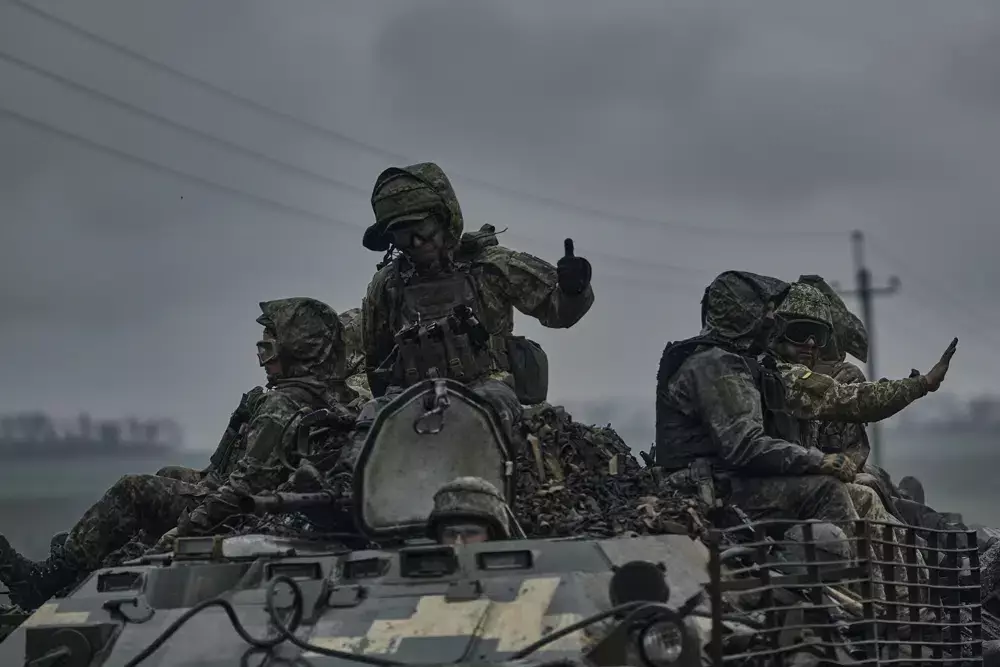
Russia launched its second large salvo of missiles at Ukraine in recent days early Monday, damaging buildings, killing two people and wounding 40 in the eastern city of Pavlohrad but failing to hit Kiev, officials said.
Air raid sirens began blaring across the capital about 3:45 a.m., followed by explosions as Ukrainian defense systems intercepted missiles.
Eighteen cruise missiles were fired from the Murmansk and Caspian regions, and 15 of them were intercepted, said Ukrainian Armed Forces Commander-in-Chief Valerii Zaluzhnyi.
The head of Kiev’s city administration, Serhii Popko, said all missiles fired at the city were shot down, as well as some drones. He didn’t provide further details.
The attack follows Friday's launch of more than 20 cruise missiles and two explosive drones at Ukraine, the first to target Kiev in nearly two months.
In that attack, Russian missiles hit an apartment building in Uman, a city about 215 kilometers (135 miles) south of Kiev, killing 21 people, including three children.
In Monday's attack, missiles hit Pavlohrad, in the eastern Dnipropetrovsk region, killing two people and wounding 40, Ukrainian President Volodymyr Zelensky said.
Seven missiles were shot at the city and “some were intercepted” but others struck an industrial facility, sparking a fire, authorities said. Damage was reported to 24 apartment buildings, 89 homes, six schools and five shops, according to regional authorities.
Missiles also hit three other areas in the Dnipropetrovsk region, damaging residential buildings and a school, said Serhii Lysak, the region’s top official.
Russian Defense Ministry spokesman Igor Konashenkov said Monday that Russia conducted “a group missile strike with long-range precision-guided airborne and seaborne weapons on facilities of Ukraine’s defense industry ... all designated facilities were struck.”
A Russian-installed official in the occupied Zaporizhzhia region, Vladimir Rogov, said the attack hit ammunition and fuel depots in Pavlohrad, which he said would impede Ukraine's planned counteroffensive.
The attacks also damaged Ukraine's power network infrastructure, which will take several days to repair, according to Ukraine's energy minister, Herman Haluschenko. He said that nearly 20,000 people in the city of Kherson and wider region had been left without power, along with others in the Dnipropetrovsk region.
Moscow has frequently launched long-range missile attacks during the 14-month war, often indiscriminately hitting civilian areas.
Anticipating the Ukrainian counteroffensive, Russian forces are especially focused now on destroying logistical routes and centers of Ukraine's armed forces, southern regional military spokeswoman Natalia Humeniuk told Ukrainian TV.
Bolstering Ukraine's capabilities for the counteroffensive are recent deliveries of American-made Patriot missiles that improve anti-missile defenses. It was not clear whether any of them were employed in trying to stop Monday morning's attack. In addition, Ukraine has been building up its mechanized brigades with armor supplied by its Western allies, who have also been training Ukrainian troops and sending ammunition.
Ukraine's Crimean Peninsula, which Russia illegally annexed in 2014, has come under periodic attack as Zelensky has vowed to reclaim it and other occupied territory.
On Monday, Russian officials reported knocking down at least two Ukrainian drones in Crimea, but they didn't make clear whether any had hit their targets. The peninsula is home to Russia's Black Sea Fleet. On Saturday, two Ukrainian drones hit a Russian oil depot in Crimea.
Ukraine doesn't acknowledge responsibility for such attacks.
In what has become a grinding war of attrition, the fiercest battles have been in the eastern Donetsk region, where Russia is struggling to encircle the city of Bakhmut in the face of dogged Ukrainian defense.
Troops from Russia's Wagner mercenary group and other forces are fighting Ukrainian troops house-to-house to try to gain control of what has become known as the “road of life” — the last remaining road west still in Ukrainian hands, critical for supplies and fresh troops.
Col. Gen. Oleksandr Syrskyi, the head of Ukrainian ground forces, said Russia continued to exert “maximum effort” to take the city but so far had failed.
“In some parts of the city, the enemy was counterattacked by our units and left some positions," he said.
In Russia's Bryansk region, which borders northern Ukraine, an explosive device derailed a freight train, regional governor Alexander Bogomaz said.
There were no immediate indications who set off the explosive, but Bryansk has suffered sporadic cross-border shelling during the war. In March, two people were reported killed in what Bryansk officials said was an incursion by Ukrainian saboteurs.